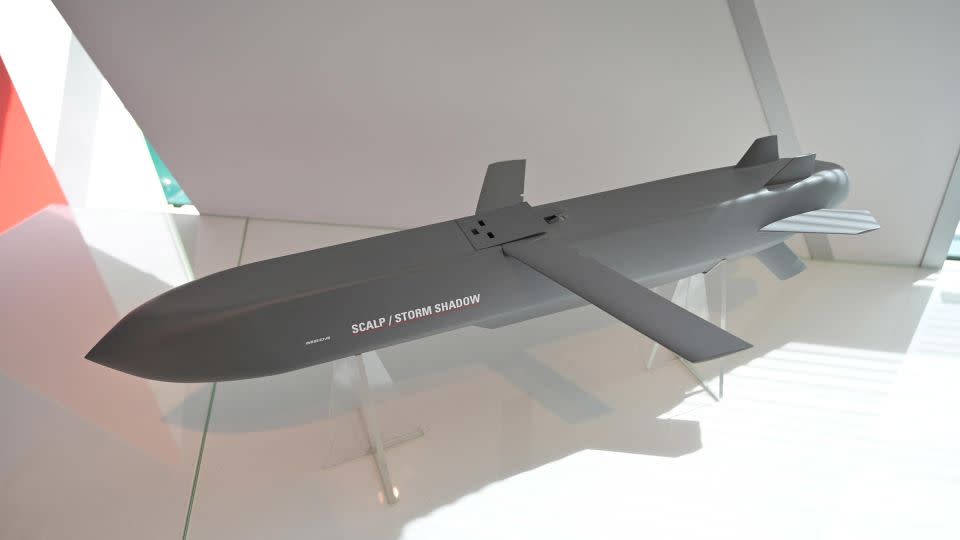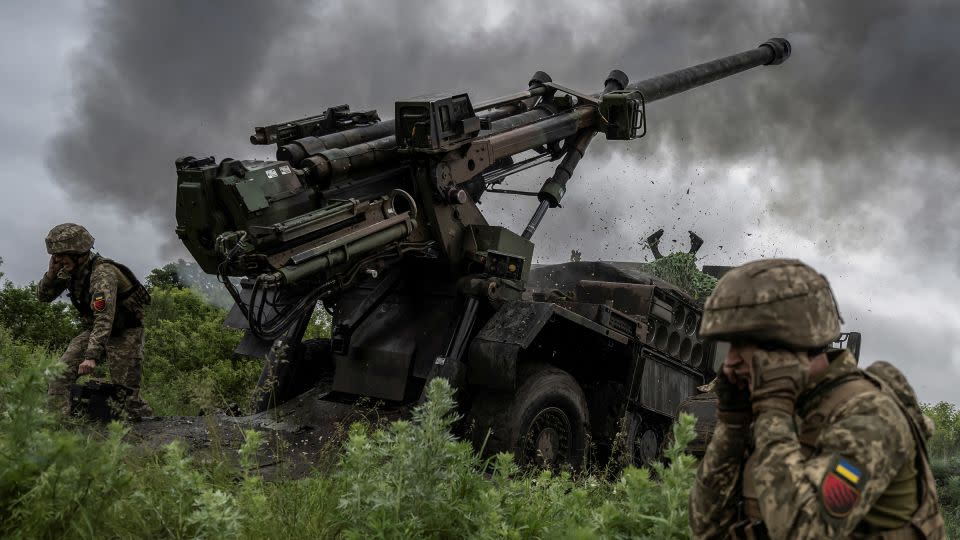Ukraine should be allowed to use French weapons, including long-range missiles, against targets inside Russia from which Moscow attacks Ukraine, French President Emmanuel Macron said Monday.
“We think that we should allow them to neutralize the military sites from which the missiles are fired and, basically, the military sites from which Ukraine is attacked,” Macron said during a press conference with German Chancellor Olaf Scholz in Brandenburg, Germany.
“Ukrainian soil is being attacked from bases in Russia. So how do we explain to the Ukrainians that we’re going to have to protect these towns … if we tell them you are not allowed to hit the point from which the missiles are fired?”
France has supplied Ukraine with an unknown number of SCALP cruise missiles, according to the French Defense Ministry’s website.
The SCALP missiles have a range of up to 155 kilometers (96 miles) and carry a 400-kilogram (881-pound) high-explosive penetration warhead, according to the Missile Threat project at the Center for Strategic and International Studies.

The SCALP is the equivalent of Britain’s Storm Shadow, which has also been given to Ukraine, and which British Foreign Secretary David Cameron said earlier this month could be used at Kyiv’s discretion.
“In terms of what the Ukrainians do, in our view it is their decision about how to use these weapons, they are defending their country, they were illegally invaded by Putin and they must take those steps,” Cameron said during a visit to Kyiv. “We don’t discuss any caveats that we put on those things. But let’s be absolutely clear: Russia has launched an attack into Ukraine, and Ukraine absolutely has the right to strike back at Russia.”
France has also supplied Ukraine with a range of military weaponry, including Caesar self-propelled howitzers with a range of up to 42 kilometers.
Macron stressed that the French arms are to be used only against targets from which attacks are launched into Ukraine.
“We must not allow them to hit other targets in Russia,” including civilian or other military targets, the French leader said.


Germany’s Scholz echoed Macron’s comments and said that Ukraine was allowed to defend itself as long as it respected the conditions given by the countries that supplied the weapons, including the United States, and international law.
“Ukraine has every possibility under international law for what it is doing. That has to be said explicitly,” Scholz said. “I find it strange when some people argue that it should not be allowed to defend itself and take measures that are suitable for this.”
But Russian President Vladimir Putin claimed Ukraine could not use the long-range weapons without significant NATO support, and such involvement by the alliance could trigger “a global conflict.”
For instance, “long-range precision weapons cannot be used without space-based reconnaissance,” Putin said Tuesday during a state visit to Uzbekistan.
“Final target selection” or “launch mission” for Western systems need to be made by “highly skilled specialists who rely on this reconnaissance data,” Putin said.
“So, these officials from NATO countries, especially the ones based in Europe, particularly in small European countries, should be fully aware of what is at stake,” he emphasized.
“They should keep in mind that theirs are small and densely populated countries, which is a factor to reckon with before they start talking about striking deep into the Russian territory.”
Meanwhile, Ukraine got a key pledge of support on Tuesday from Belgium, which said it will supply Kyiv with 30 F-16 fighter jets in the next four years, according to Ukrainian President Volodymyr Zelensky.
The deal was part of a bilateral security agreement signed between the two countries Tuesday in Brussels, according to the Ukrainian leader.
The agreement includes at least $1.06 billion in Belgian military aid to Ukraine this year, with Belgium offering its long-term commitment to support Ukraine over the next 10 years, Zelensky detailed in a post on X. The first F-16 jets from Belgium will be delivered this year.
“The agreement guarantees Belgium’s timely security assistance, modern armored vehicles, equipment to meet Ukraine’s air force and air defense needs, naval security, mine clearance, participation in the artillery ammunition coalition, and military training,” Zelensky said.
The meeting follows a similar agreement between Ukraine and Spain on Monday, with Spanish Prime Minister Pedro Sánchez announcing a $1.08 billion weapons deal for Ukraine.
Alongside Belgium and Spain, the United Kingdom, Germany, France, Italy, Denmark, Finland and Canada have also signed security agreements.
CNN’s Caitlin Danaher, James Frater, and Svitlana Vlasova contributed to this report.
For more CNN news and newsletters create an account at CNN.com
Source Agencies

